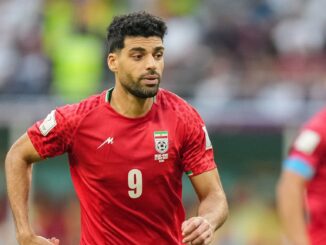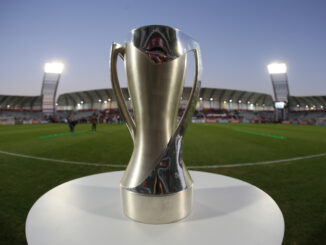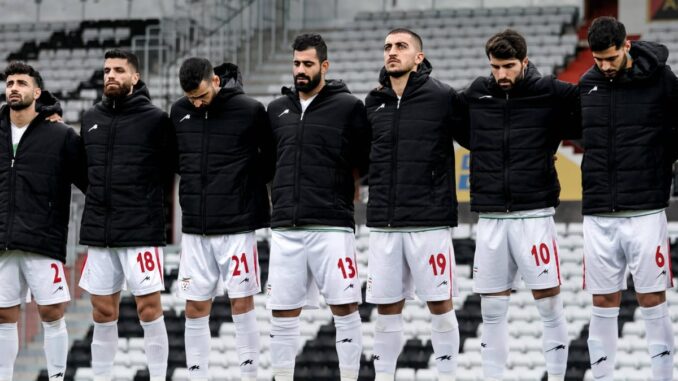

The Asian Game’s coverage of the FIFA World Cup Qatar 2022 is proudly sponsored by SMC.
For a few weeks in early September, the drama surrounding Carlos Queiroz’s return to coach Iran for what will be a third successive World Cup was the talk of Iran, consuming copious amounts of air time and column inches across the country.
Then Masha Amini was killed.
The 22-year-old with her whole life ahead of her was reportedly beaten to death in police custody just days after being arrested by the Islamic Republic’s morality police for, apparently, not wearing the hijab in accordance with government standards.
Suddenly, the debate and conjecture over which foreigner would coach a group of 26 men at a game of football seemed rather irrelevant.
Amini’s death sparked country-wide outrage, protests and rebellion, with women burning their hijabs in the streets and cutting their hair in open defiance of the country’s religious leaders.
In a country like Iran where not just football and politics, but politics and everyday life are so interwoven, the football team, while on one hand irrelevant in the grand scheme of things, took on even more significance.
Players wore plain black jackets ahead of their recent friendly with Senegal, taken as a symbol of solidarity with the protesters, even if that has been disputed by those within the team, while many former and current players have been openly vocal in their support of Iranian women protesting against their government, not always something that is well received by the state.
Legendary former player Ali Karimi, who is based in Dubai, has long been vocal in his support, which reportedly led to his house being raided and sealed by security forces. Meanwhile former player Hossein Mahini, who was part of Queiroz’s squad for the 2014 World Cup, was arrested during a raid of his home.
But the comments that were heard loudest came from arguably the team’s biggest star, Sardar Azmoun, who defiantly took to Instagram to post his message of support:
“Due to the rules of the National Team, we were not allowed to say anything until the conclusion of our current training camp, but I am no longer able to tolerate silence.
“If they want to cut me from the team it is the sacrifice for a single strand of hair on an Iranian woman. There is no way this post will be erased. Shame on all you how easily you murder people. Long live the Iranian women.”
It prompted Iranian judiciary chief Gholam-Hossein Mohseni-Eje’i to issue a stern warning, which just highlighted the bravery, and risk, of those choosing to make their voices heard.
“Those who became famous with the support of this system…all of them should know that they have to pay for the damages caused to this country…they will be identified and they will be punished for their actions.”
While trivial in the context of the wider fight for justice and equality within the country, just how the ongoing unrest impacts on Iran’s lead in to the World Cup remains to be seen. This, sadly, is nothing new for Iranian football, but with a number of their players domestically-based it does run the risk of compromising their preparations.
The beginning of the end
“I don’t care about this. Of course there is a story, but we are focused on the playing.”
That was Dragan Skocic’s verdict after Iran were drawn to play the United States of America in the group stage of this year’s FIFA World Cup. Given the historical and ongoing political tension that exists between the two countries, the narrative around the match was set as soon as the two nations were grouped together.
While Skocic may not have cared for the geopolitical implications of such a match up, influential figures in Iran certainly did. This was more than just a regular football match. National pride is always on the line at the World Cup, but this match, and to a lesser degree the one against England, escalated things to a new level.
Embed from Getty ImagesTo lose, to the USA of all teams, would bring immense shame. Not everyone would feel that way, but those with influence and power within the ruling party certainly would.
Little did he know at the time, but Skocic’s fate was arguably sealed the moment Qatari football legend Adel Ahmed Malalla drew Iran’s name out of the pot to be drawn alongside not just the USA, but another political foe in England as well.
“For sure, our Government officials don’t like (the thought) we (could) lose to the USA,” respected Iranian journalist Hatam Shiralizadeh recently told The Asian Game Podcast.
“As you know, we have a political problem with them, so it’s a very important match for them [Government officials], and for us [fans], for sure. Some of them believe that we can’t win or take a draw from the US with Skocic, so they tried to change the coach behind the scenes, and put pressure on the Football Federation to change the coach.”
While the FFIRI initially resisted that pressure, which led to the farcical situation in July of Skocic being ‘sacked’ only to be ‘reinstated’ just a few days later, the final outcome was always inevitable.
It was, as our very own Scott McIntyre called it at the time, simply a “stay of execution”. His days were numbered and now his time is up.
That April night in Doha set in motion a chain of events that have led us to where we are today, with Skocic forced to endure a months long and very public sacking, replaced by the man whose shadow the Croatian has had to operate in since being appointed – Carlos Queiroz.
And so, on 13 September, the worst kept secret in football was officially confirmed when Queiroz himself tweeted:
“When the family call you home, all you do is simply just show up.”
How we got here
It’s hard to know what more Dragan Skocic could have done to avoid getting sacked as Iran coach, just two months short of this year’s FIFA World Cup, except perhaps change his name to Carlos Queiroz.
While his appointment wasn’t universally popular within Iranian football, Skocic, who had worked across Iran and the Middle East since 2011, was seen as a safe pair of hands given his knowledge of Iranian football and Iranian players, taking over from Marc Wilmots after the Belgian’s disastrous rein in charge of Team Melli saw them on the brink of an embarrassing first round exit.
Skocic’s arrival brought with it an instant change in fortunes for Team Melli, who not only avoided an embarrassing early exit but then went on to win 15 of his 18 matches in charge.
His Iran side made light work of the final round of qualifying, losing just once on the way to finishing top of Group A.
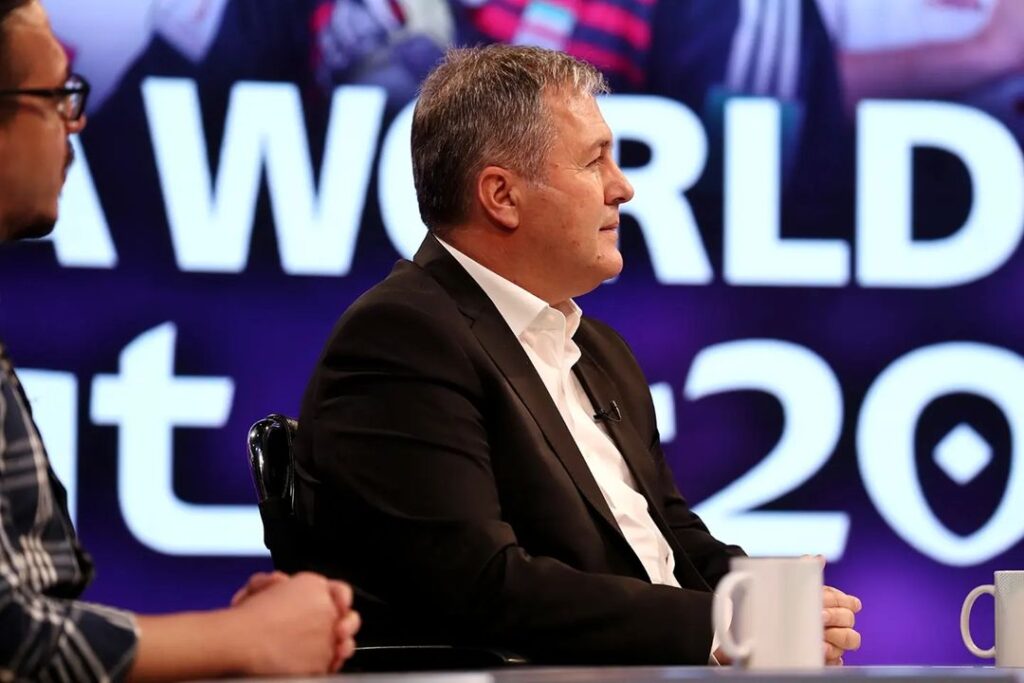
As Martin Lowe wrote back in January:
“Skocic, a professional, flexible coach has become the calming and guiding influence this group quite clearly required. Four wins from four in June’s Round 2 centralised culmination dragged them over the line, while an uncompromising relentlessness in Round 3 proved Team Melli were more than the exceptionally talented individual players on the pitch.”
While they achieved great things under Queiroz, built upon a foundation of defensive solidity, there also existed a sense they had underachieved under the former Real Madrid coach such was the talent at his disposal.
It always seemed counterintuitive to play with such a defensive mindset when he had such attacking weapons at his disposal. But it played beautifully into the narrative that underpinned Queiroz’s entire reign as Team Melli coach.
Everything was a fight, and often that was with his own federation.
Lowe again:
“Queiroz’s stature in Iranian football transcended that of merely the national team coach, to that of an unequivocal symbol of a nation’s sport. His influence across politics, culture and beyond made a campaign for World Cup qualification feel more like a freedom fight against the establishment.”
And so it was only natural that Queiroz’s teams played in that same manner. But such a force cannot always be an underdog, especially within the sphere of Asian football where Iran had been ranked #1 for a large part, there needed to be an evolution in the way Iran played and approached its football, one that Queiroz seemed incapable of delivering.
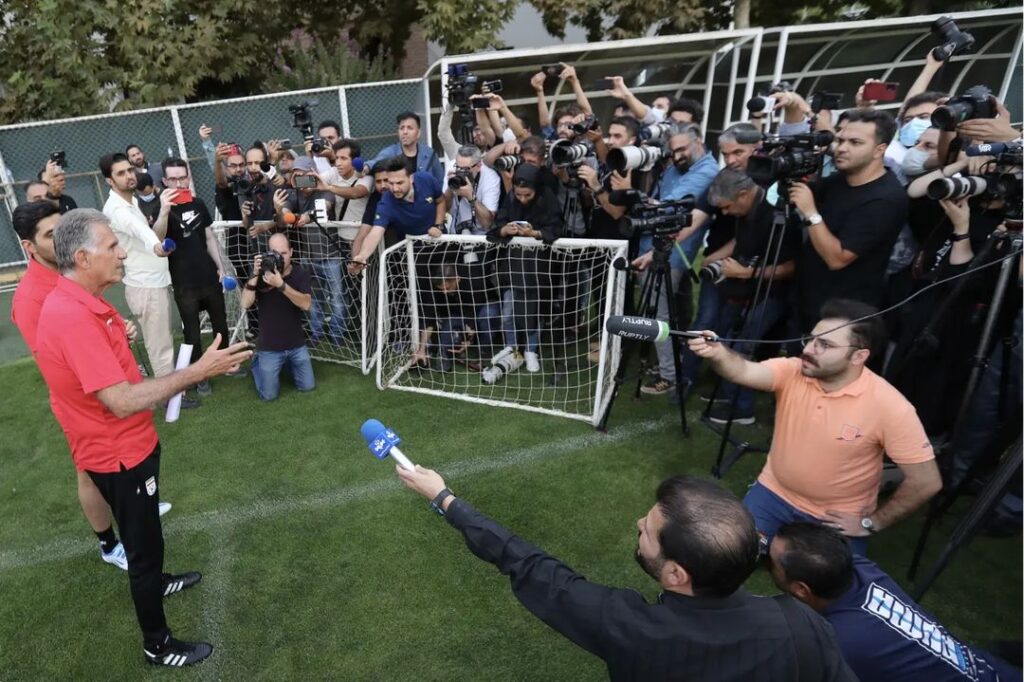
While Wilmots’ arrival was meant to herald that new era for Iranian football, it was Skocic that first saved the day and then sought about taking Iran in that new direction.
While he was appointed under a cloud of controversy, with claims the FFIRI were sidelined by influential political figures in his appointment, on the pitch at least they were notably less defensive and more attacking with their intent. It seemed to be a natural fit.
But not everyone was happy.
“Some players didn’t have a good relationship with the coach,” winger Alireza Jahanbakhsh recently told The Athletic.
“They didn’t like the way he was playing. Some players had a very good relationship. Usually, in my experience, that’s kept in the team.
“Things that happened were unprofessional. I can’t mention names, but there were people from outside who wanted to really affect the national team in terms of decisions and stuff.
“Unfortunately, there were players who followed that up, which was quite sad. We, as some of the more experienced players, tried to calm it down.
“We said, ‘Okay, we’ll stay right in the middle, it’s not our decision’. Now is not the time to be messing up things. That just affects us in a negative way. Thank God, everything now is more calm and settled.”
While the arrival of Queiroz last month looked for a period to have galvanised a somewhat divided dressing room, the latest unrest in Iran has the potential to make those divides even wider.
Many fans are upset with Mehdi Taremi for what they see as his tacit support of the Iranian regime, which is in stark contrast to the vehement denouncement of the regime by his strike partner Sardar Azmoun, although he has gone some way to appeasing those fans with more vocal support for the protesters in the past few weeks.
Meanwhile, national team midfielder Mehdi Torabi made himself public enemy number one recently after his refusal to wear a black wristband in support of the protesters in a recent match between Persepolis and Tractor Sazi.
Further, it was reported in Iran that Torabi insisted on taking a late penalty for Persepolis, despite not being their regular penalty taker, as he wanted to reveal a message written on his shirt underneath in support of the Iranian regime.
He missed the spot kick, but the backlash he received on social media certainly didn’t miss with many demanding the Torabi never play for the national team again.
Queiroz is no stranger to the politics of coaching Iran. In many ways he revels in it. But this is uncharted territory, even for him.
It’s often said sport and politics shouldn’t mix. In Iran, sport and politics are always mixed, but never has that been more true than right now.
Listen to the latest episode of The Asian Game Podcast as we go In Conversation With… Panos Armenakas


